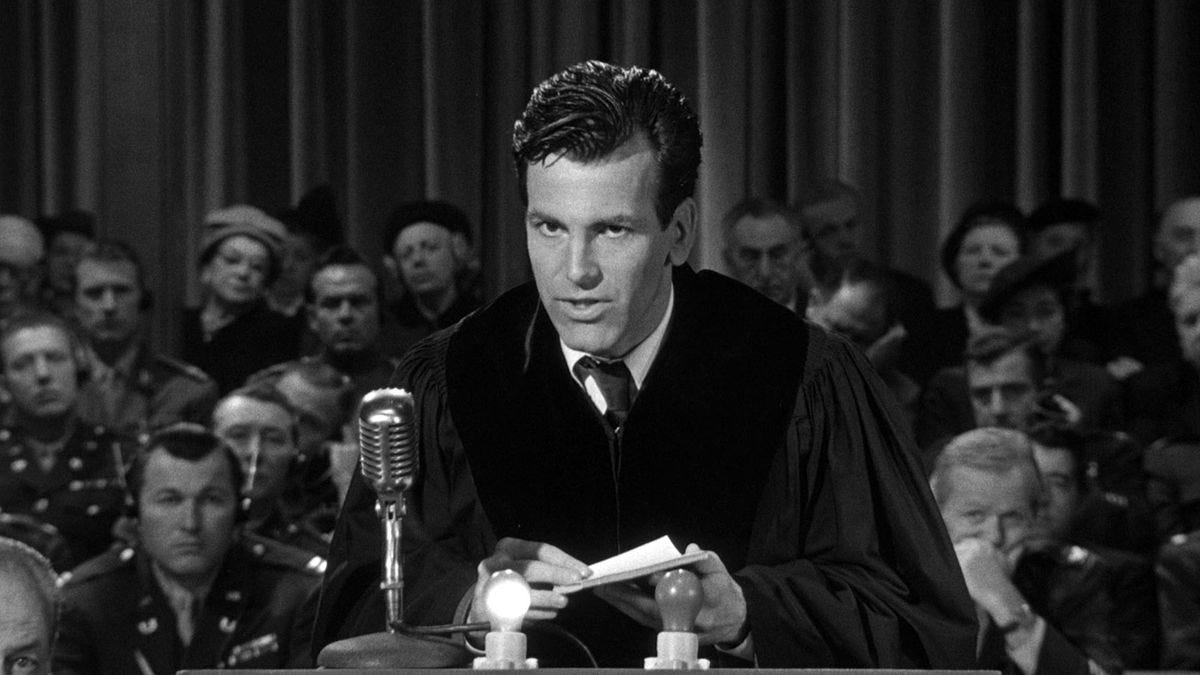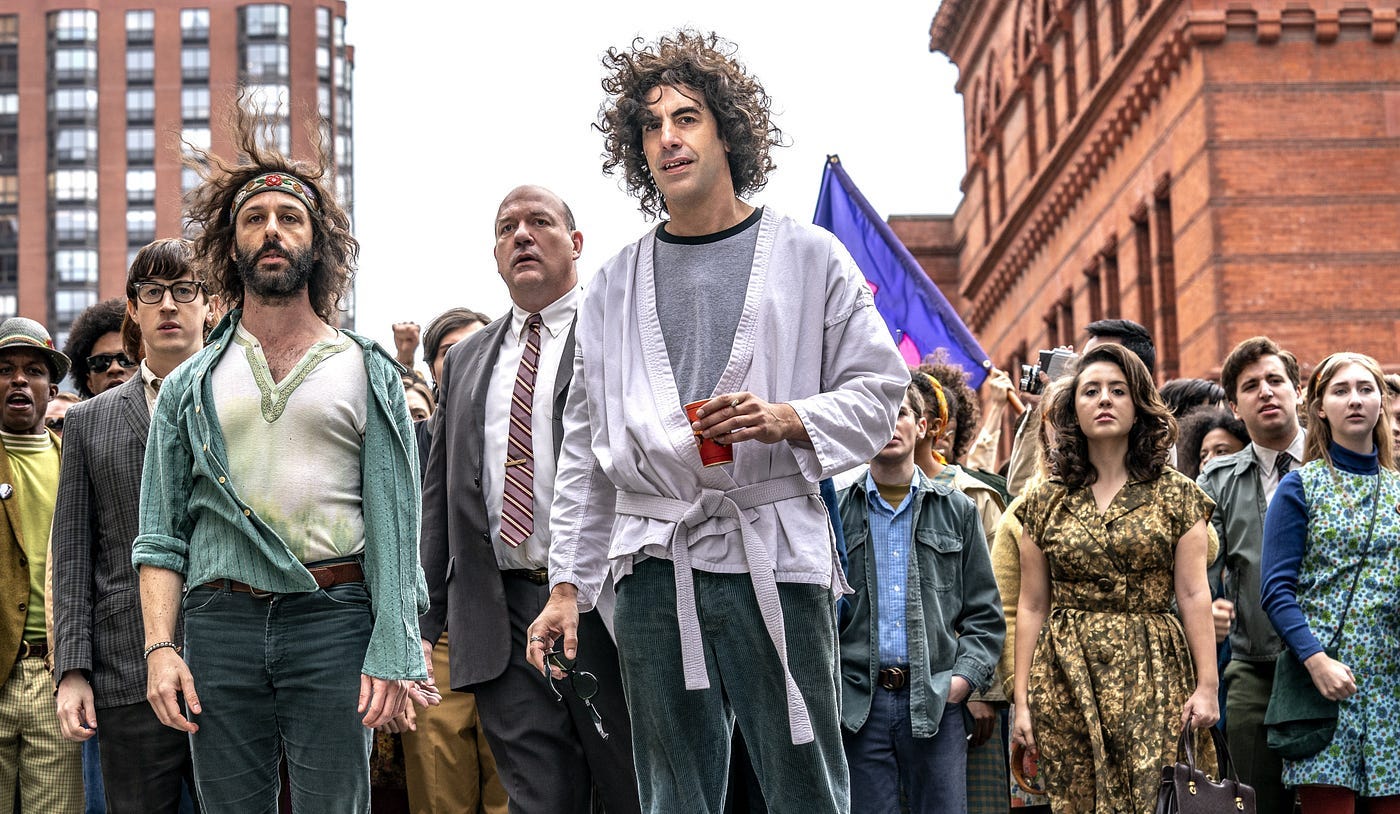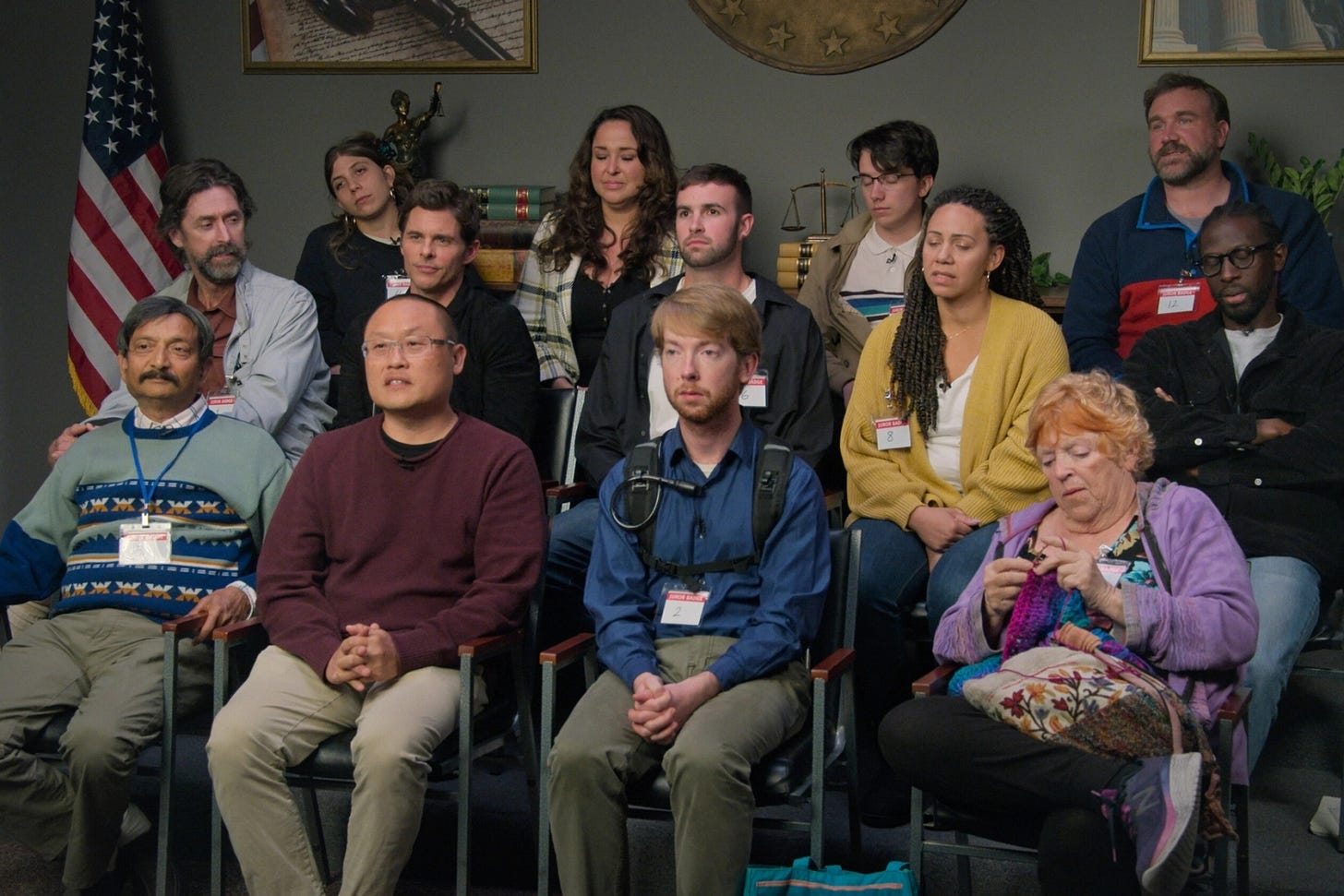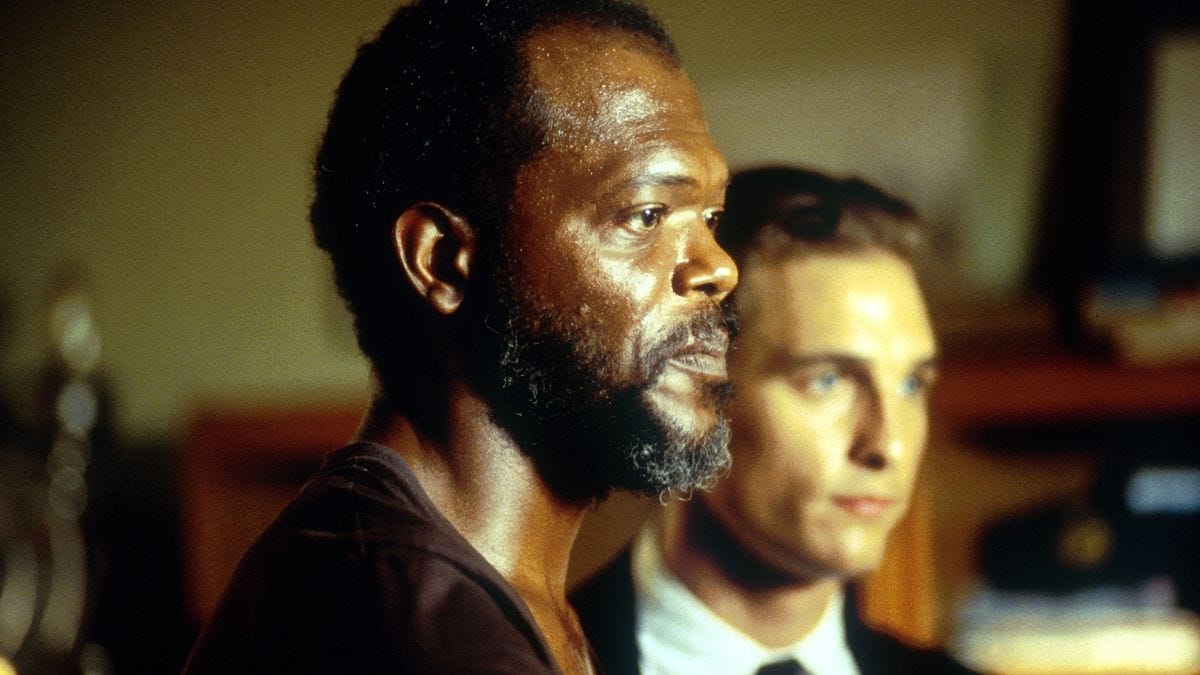Feature Presentation’s Staff Picks is not a best-of list. How do you even craft a list of the best of something as subjective as film? This is a list designed to highlight films (and occasionally television shows or other mediums of entertainment) of a certain theme or topic. It’s a watchlist, they are suggestions. Movies on this list will very in quality, length, genre, and home video or streaming availability.
This list’s theme: Courtrooms
Judgment at Nuremberg (1961)
In 1947, four German judges who served on the bench during the Nazi regime face a military tribunal to answer charges of crimes against humanity. Chief Justice Haywood hears evidence and testimony not only from lead defendant Ernst Janning and his defense attorney Hans Rolfe, but also from the widow of a Nazi general, an idealistic U.S. Army captain and reluctant witness Irene Wallner.
When I was in elementary school, someone's dad, a lawyer, came and spoke to us on Career Day. He had a very difficult job explaining to a bunch of children, probably fourth grade, just old enough to understand, how he spent his days as a defense attorney arguing innocence for clients he often knew were guilty. That's something that's stuck with me all these years: does an admission of guilt automatically mean that you are guilty?
Many courtroom dramas thrive when they let the actor playing the slimeball attorney slime it up over the courtroom. This movie has one of those all-time great performances from Maximilian Schell as Hans Rolfe, the defense counsel for Nazis put on trial for war crimes in Nuremberg, Germany, just after the war. They never mention whether or not he is a Nazi, but he's a Nazi sympathizer at the very least, arguing that what they did was merely an order from the top down and that these men were just doing as they were told. (He also poses the question: If these men are guilty, how many more are? It's an unprecedented question.) In an Oscar-winning performance, he's brash, he's big, he's intimidating, but you are compelled to listen to his case. It seems like an outrageous defense until you hear it come out of his mouth. Surrounded by excellent performances from Spencer Tracy, Burt Lancaster, and a powerful late-career Judy Garland, he comes out above the rest.
The Trial of the Chicago 7 (2020)
What was supposed to be a peaceful protest turned into a violent clash with the police. What followed was one of the most notorious trials in history.
When I first saw this movie in September 2020, it touched me very deeply. Perhaps I was desperate for some semblance of sanity in this country, even going as far as to write, "What a movie for an election year. Actually, we are currently voting in this country. It’s not election season - it’s Election Day in America for the next six weeks. This film about corruption, protesting, democracy, justice - it’s a movie for now. It wears both 1968 and 2020 on its sleeve without shame."
With some distance, living life under a different presidency, and the ability to leave my apartment, I can see now that it was probably more of a movie for that time. And there are a lot of things that don't work about it - Aaron Sorkin gets in his own way often, Eddie Redmayne is egregious, and the historical inaccuracies are often truly misguided in its attempts to navigate centrism.
But the emotions that it wants from you still play. Say what you want about Sorkin, but he understands story structure better than he understands leftism, at the very least. Mark Rylance, Sacha Baron Cohen, Michael Keaton, and others all help his work out when it needs it.
Call me corny, but I teared up during the last scene. It's also completely fabricated. Do with that what you will.
Jury Duty (2023)
It follows the workings of an American jury trial through the eyes of Ronald Gladden, a juror who is unaware the entire case is fake. (IMDB)
I believe that there are two types of people in this world: The Office people and Parks and Recreation people. Though I can watch both, I'm a Parks person because of one distinct difference...
The Office deals mainly in mean-spirited humor. It's cringe, it's pointed at people, it's about idiots and weirdos and losers. Parks and Rec, on the other hand, finds a lot of its charm in an over-indulgence of love, characters like each other too much, they always want to do as much good as possible.
Jury Duty, from Office writers and producers Lee Eisenberg and Gene Stupnitsky, sits nicely in that Parks and Rec lane. Is that largely because the man that they experimented on, Ronald, is the nicest guy of all time? Probably. But they've found this way of messing with someone that doesn't seem damaging or upsetting or twisted. In fact, they refer to Ronald and his humanitarianism, his pursuit of fairness and justice, and his overall good nature as "heroic." The show is light-hearted and goofy, but there's an underlying message there that could maybe only come out within the walls of a courtroom filled with a jury of your peers.
I have jury duty in August and I can't wait to be super paranoid the entire time.
A Time to Kill (1996)
A young lawyer defends a black man accused of murdering two white men who raped his 10-year-old daughter, sparking a rebirth of the KKK.
I must confess that I didn't rewatch this film before writing this piece. But when I realized I already had an Aaron Sorkin film on the list, I figured my credibility was already shot with some people, so I might as well go all the way and include the John Grisham movie.
I didn't rewatch it in large part because I was scared to, scared that it wouldn't hold up in the over 25 years since it came out - and over 30 years since the book's first publication. And it's very likely that it doesn't when it comes to its feelings on race, something it tackles head-on, from the KKK to what's essentially a To Kill A Mockingbird rewrite, white lawyer to black defendant and all. But it's directed by Joel Schumacher (Batman Forever! Phone Booth!) and features a cast that plays like a late-'90s All-Star Team: Matthew McConaughey, Samuel L. Jackson, Sandra Bullock, Kevin Spacey, Oliver Platt, Ashley Judd, and Donald and Kiefer Sutherland. It can't be that bad...right?
Anatomy of a Murder (1959)
Semi-retired Michigan lawyer Paul Biegler takes the case of Army Lt. Manion, who murdered a local innkeeper after his wife claimed that he raped her. Over the course of an extensive trial, Biegler parries with District Attorney Lodwick and out-of-town prosecutor Claude Dancer to set his client free, but his case rests on the victim’s mysterious business partner, who’s hiding a dark secret.
The defendant turns to his lawyer, just moments after his particularly pointed question was stricken from the record, and says, "How can a jury disregard what it's already heard?"
"They can't, Lieutenant. They can't," he remarks with a smirk on his face.
If a showboating lawyer can make or break a courtroom film, then who would you want other than Jimmy Stewart?
What if he went toe-to-toe with prosecutor George C. Scott?
The two go back and forth, pushing the limits of their witness examinations, questionings, objections, and their judge's ability to hold down a courtroom. I can't imagine they would get away with most of their grandstanding, but with an admittedly sleepy judge on the bench, they really play up all of the things that we like about movie lawyers. They scream objection and mic-drop witness questions and scream and yell and speak some legalese and say things that they know the jury can't forget. I've never participated in a murder trial in any capacity, but I can't believe lawyers would actually act like this. But that's why we love the movies!
Credit: Each plot synopsis comes from Letterboxd via TMDb.
Cut the Cord: Law & Order
For more great courtrooms films, check out this edition of Cut the Cord. If you like these, you'll like those.









